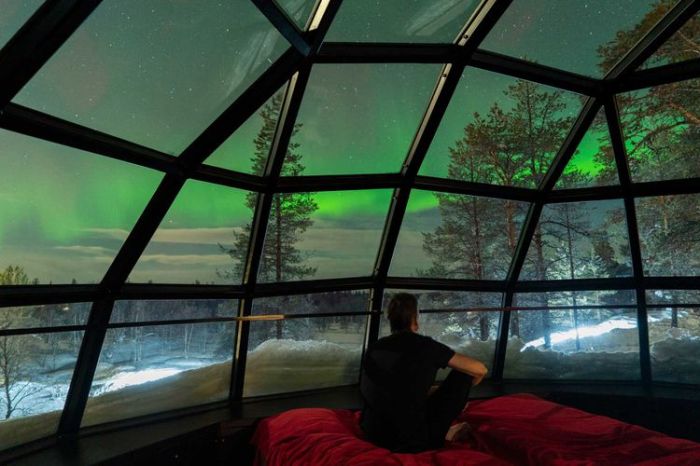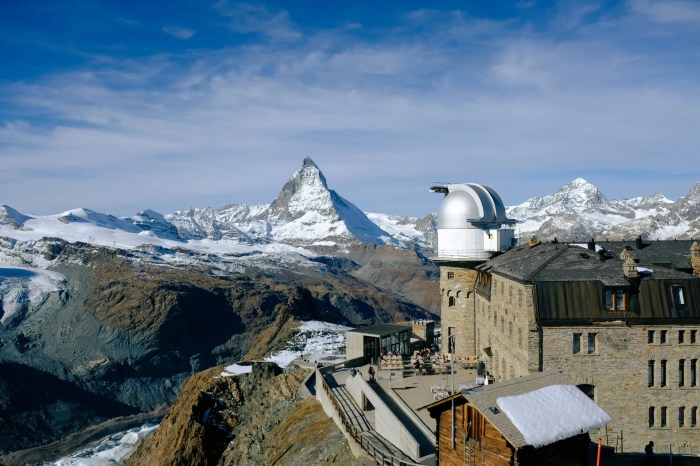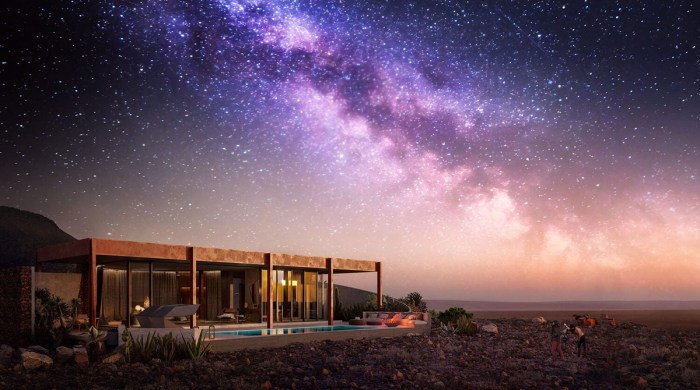Best Hotels For Stargazing And Astronomical Events
Best Hotels for Stargazing and Astronomical Events invites you to explore the breathtaking beauty of the night sky from the comfort of specially chosen accommodations. Imagine lying under a blanket of stars, far from city lights, where the wonders of the universe unfold before your eyes. These hotels are not just places to stay; they are gateways to unforgettable experiences, where every twinkling star tells a story.
From majestic mountains to serene deserts, some locations are perfect for stargazing, offering ideal conditions with low light pollution and breathtaking views. Discover hotels equipped with rooftop observatories and telescopes, where you can join guided tours and workshops during significant celestial events. With the right timing and preparation, your stargazing journey can become a magical adventure.
Best Locations for Stargazing

Source: travelandleisure.com
Stargazing is a captivating activity that draws people to some of the most breathtaking locations around the globe. Whether it’s the shimmering Milky Way or a rare astronomical event, the right location can elevate the experience to extraordinary heights. With clear skies and minimal light pollution, these places allow a deeper connection with the universe.Certain geographical features contribute to the ideal stargazing conditions found in these locations.
High altitudes, dry climates, and remote areas significantly reduce light pollution and atmospheric interference, providing clear and unobstructed views of the night sky. Below are some of the best stargazing destinations known for their exceptional celestial displays.
Top Stargazing Destinations
The following table showcases remarkable places around the world that offer extraordinary stargazing opportunities. Each location is distinguished by its altitude and light pollution level, making it a haven for astronomy enthusiasts.
| Location | Country | Altitude (meters) | Light Pollution Level |
|---|---|---|---|
| Mauna Kea | USA | 4,207 | Very Low |
| Atacama Desert | Chile | 2,400 | Very Low |
| Big Bend National Park | USA | 1,520 | Low |
| Aoraki Mackenzie | New Zealand | 800 | Low |
| Tenerife | Spain | 3,718 | Low |
Each of these locations not only offers pristine views of the sky but also unique experiences. For instance, Mauna Kea in Hawaii is known for its observatories, while the Atacama Desert, one of the driest places on earth, is ideal for astrophotography, allowing for stunning captures of the cosmos. The combination of altitude and clarity in these regions creates a perfect environment for witnessing celestial wonders.
Hotel Features for Stargazing
For stargazing enthusiasts, the right hotel can transform a simple getaway into an extraordinary experience beneath the stars. The ideal accommodation should not only provide comfort but also foster a deep connection with the night sky. When searching for the perfect place to observe celestial wonders, certain features can significantly enhance the stargazing experience.Essential hotel features for stargazing include specialized amenities that cater to both amateur and seasoned astronomers.
A thoughtfully designed environment can make all the difference, ensuring guests have everything they need to immerse themselves in the beauty of the cosmos.
Amenities and Features for Stargazing Hotels
When selecting a hotel for stargazing, certain amenities stand out as vital for a truly memorable experience. Here is a comparison of key features that enhance the stargazing experience:
| Hotel Feature | Description | Importance for Stargazing |
|---|---|---|
| Rooftop Observatory | A dedicated space for observation with minimal light interference. | Offers an unobstructed view of the night sky. |
| Telescope Availability | On-site telescopes for guest use. | Allows guests to explore celestial bodies in detail. |
| Dark Sky Initiatives | Efforts to minimize light pollution around the hotel. | Enhances visibility of stars and other celestial phenomena. |
| Stargazing Tours | Guided tours led by knowledgeable astronomers. | Provides insights and stories about the stars and constellations. |
| Cozy Outdoor Viewing Areas | Comfortable seating and blankets in outdoor spaces. | Encourages relaxation and enjoyment of the starlit sky. |
Several hotels have distinguished themselves by excelling in these features, making them prime locations for stargazing. For instance, the Château Lake Louise in Canada offers a rooftop deck and frequently organizes astronomy events. The Aoraki Mount Cook Motel in New Zealand has embraced dark sky initiatives, providing guests with tools and information to enhance their stargazing experience. Similarly, the Big Bend Resort in Texas features guided stargazing tours that are popular among visitors, showcasing the beauty of the night sky in one of the darkest locations in the United States.
Choosing a hotel with stargazing features can transform your travel experience into a celestial adventure.
Events and Activities

Source: thetravelimages.com
Stargazing is not just about looking at the night sky; it’s an immersive experience that can be enhanced by special astronomical events and activities offered by hotels. Travelers seeking to connect with the cosmos can partake in unique celestial experiences designed to make their stay unforgettable. From meteor showers to lunar eclipses, these events provide a perfect backdrop for romance, wonder, and education.Many hotels in prime stargazing locations organize exciting events around significant astronomical occurrences.
This not only enhances the experience for guests but also fosters a deeper appreciation for the universe. Here is an overview of some notable astronomical events and the activities associated with them.
Major Stargazing Events Calendar
Throughout the year, several celestial events captivate stargazers. These events provide opportunities for travelers to witness breathtaking displays of nature. Here are some of the most popular astronomical events that hotels may host special activities around:
- Perseid Meteor Shower (August 12-13): This annual meteor shower is one of the most spectacular, with rates of up to 60 meteors per hour. Hotels might offer midnight stargazing parties with telescopes and hot chocolate.
- Geminid Meteor Shower (December 13-14): Known for its bright and colorful meteors, the Geminids are best viewed during the early morning hours. Hotels could organize guided excursions to optimal viewing spots.
- Summer Solstice (June 21): The longest day of the year brings festivities that celebrate the sun. Some hotels host sunrise yoga sessions or evening bonfires under the stars.
- Full Moons: Each month’s full moon presents a unique opportunity for night hikes or moonlit dinners in stunning outdoor settings. Special menus may be crafted to celebrate the occasion.
- Solar and Lunar Eclipses: These rare occurrences draw special attention, and hotels often provide educational workshops and safe viewing equipment for guests.
These celestial highlights are ideal for creating memorable experiences for guests and connecting them with the wonders of the universe.
Hotel Activities During Astronomical Events
To enhance the stargazing experience, many hotels engage guests in a variety of activities during significant astronomical events. These activities not only provide enjoyment but also educational insights into the cosmos. Hotels might offer:
- Guided Stargazing Tours: Expert astronomers lead guests through the night sky, pointing out constellations, planets, and other celestial phenomena while providing fascinating insights.
- Astronomy Workshops: Interactive sessions that delve into the science of astronomy, often including hands-on activities like building simple telescopes or learning about astrophotography.
- Nighttime Bonfire Gatherings: Guests can share stories and experiences under the stars while enjoying warm refreshments, creating a community atmosphere.
- Special Themed Dinners: Culinary experiences that coincide with astronomical events, featuring dishes named after celestial bodies or inspired by constellations.
- Telescope Rentals: Facilities for guests to rent telescopes for private observation sessions, often with assistance from hotel staff or local astronomy clubs.
These activities not only enrich the experience but also foster a love for astronomy, making each stargazing opportunity more than just a visual experience; it becomes a journey of discovery and connection.
Travel Tips for Stargazing
Stargazing is not just a hobby; it’s a way to connect with the universe. To make the most of your celestial adventures, it’s essential to plan ahead. This guide offers practical travel tips to enhance your stargazing experience, from timing your visits to packing the right essentials. Timing is crucial when it comes to stargazing. The best times of year and locations can greatly influence your experience.
Typically, late spring to early autumn provides clearer skies and warmer temperatures in many regions. However, specific events like meteor showers or eclipses can occur at various times throughout the year.
Best Times for Stargazing
Choosing the right season and time of night can elevate your stargazing experience. Here are some guidelines to help you plan:
- Spring (March to May): This season often offers clear skies and mild temperatures, perfect for stargazing before summer heat sets in.
- Summer (June to August): Summer nights are warm, but light pollution can be problematic. Consider heading to darker areas for the best views.
- Fall (September to November): Crisp air and longer nights make autumn ideal for stargazing, especially during meteor showers like the Perseids.
- Winter (December to February): Cold nights can deter some, but winter skies are typically clearer, revealing stunning constellations.
Packing Essentials for Stargazing
Equipping yourself properly can make a significant difference in your experience. Here’s a list of essentials to pack for a successful stargazing trip:
- Warm Clothing: Layered clothing is essential for keeping warm during long nights outside.
- Blankets or Sleeping Bags: Comfortable seating or lying arrangements help you relax and enjoy the view.
- Binoculars or Telescopes: While the naked eye can reveal much, these tools can enhance your experience and show you more detail.
- Red Flashlight: A red light preserves your night vision while allowing you to see your surroundings.
- Star Maps or Apps: These tools can help you identify constellations and celestial events in real-time.
Dos and Don’ts While Stargazing
Following certain guidelines can significantly enhance your stargazing experience. Here are some important dos and don’ts to keep in mind:
Understanding what to do and what to avoid can ensure a more enjoyable and respectful experience under the stars.
- Do: Arrive early to get settled and enjoy the transition from sunset to night.
- Do: Be respectful of fellow stargazers and keep noise levels low.
- Do: Use a star app to help identify celestial objects.
- Don’t: Use white light; opt for red light to maintain your night vision.
- Don’t: Forget to check the weather forecast; cloudy skies can ruin the experience.
- Don’t: Leave trash behind; always clean up after yourself to preserve the environment.
Environmental Considerations

Source: iconiclife.com
The beauty of the night sky is a treasure that should be preserved for future generations. As more people seek to connect with the cosmos, the importance of maintaining dark skies and protecting our natural environment has never been more critical. Dark sky reserves play a vital role in safeguarding these pristine nighttime vistas, ensuring that stargazers can enjoy celestial wonders free from the interference of artificial light.Dark sky reserves are designated areas that prioritize the preservation of natural night skies by minimizing light pollution.
These locations not only enhance the stargazing experience but also promote ecological health and biodiversity. The establishment of such reserves helps communities recognize the value of their night skies and the importance of reducing light pollution. By doing so, they protect nocturnal wildlife and maintain the integrity of ecosystems that depend on natural light cycles.
Eco-Friendly Hotels Committed to Stargazing
A growing number of hotels are adopting eco-friendly practices aimed at reducing light pollution and supporting stargazing initiatives. These establishments understand the significance of preserving the environment while providing their guests with extraordinary views of the night sky. Here are some examples of eco-friendly hotels dedicated to this cause:
- Hotel A: Nestled in a dark sky reserve, this hotel uses motion-sensor lighting to minimize light pollution while offering guided stargazing tours to educate guests about the cosmos.
- Hotel B: This eco-lodge is solar-powered and employs outdoor fixtures that direct light downward to reduce glare, providing visitors with an unobstructed view of the stars.
- Hotel C: Known for its sustainable practices, it partners with local conservation groups to host nighttime events focused on astronomy and wildlife preservation.
Each of these hotels not only enhances the stargazing experience but also actively contributes to environmental conservation. Through initiatives like education programs and partnerships with local organizations, they create a unique blend of hospitality and environmental stewardship.
“Protecting our dark skies is not just about stargazing; it’s about preserving our planet for future generations.”
As travelers choose accommodations that prioritize sustainability, they help ensure that the beauty of the universe remains accessible and vibrant. By supporting hotels that are committed to eco-friendly practices, stargazers can enjoy breathtaking views while contributing to the protection of our planet’s natural wonders.
Personal Experiences and Testimonials
Many travelers have discovered the magic of stargazing while staying at hotels designed for an unobstructed view of the night sky. These experiences not only offer moments of awe but also create lasting memories that connect people to the universe. The serene beauty of a clear sky filled with stars can evoke emotions that are hard to put into words, making it a transformative journey for many.Experiencing the night sky in remote locations has profound emotional and educational benefits.
It allows individuals to step away from the hustle and bustle of daily life and immerse themselves in the wonders of astronomy. Guests often report feeling a deep sense of peace and connection to nature, as the stars remind us of our place in the cosmos. These experiences have been shared by many, and their sentiments reflect the rich tapestry of human connection to the universe.
Traveler Testimonials
The following quotes from travelers and stargazing enthusiasts illustrate the profound impact that stargazing can have on individuals:
“Sitting under the vastness of the Milky Way, I felt like a tiny part of something much greater. It was humbling and exhilarating at the same time.”
Emily, a stargazing enthusiast
“The moment I saw a shooting star, I realized how rare and beautiful these moments are. It turned a regular vacation into a life-changing experience.”
James, amateur astronomer
“I never thought I could learn so much just by looking up. The clarity of the sky made constellations come alive, and I’ve gone home with a new passion for astronomy.”
Sarah, traveler
In addition to personal testimonials, many astronomers also share their thoughts on stargazing hotels. Their insights highlight the importance of dark skies for both scientific observation and personal enjoyment.
“Stargazing is not just about seeing the stars, it’s about understanding our universe. Each glimpse into the cosmos is a lesson in humility and curiosity.”Dr. Tim, professional astronomer
“Staying in a hotel far from city lights allows for an experience that deepens our appreciation for the universe. It’s a reminder of the beauty that exists beyond our everyday lives.”Dr. Maya, astrophysicist
These personal stories and professional insights combine to showcase how stargazing in remote locations can transform a simple getaway into a profound journey of discovery and connection.
Closing Summary
In summary, the world is dotted with incredible hotels that provide unique opportunities for stargazing and engaging in astronomical events. By selecting the right destinations and accommodations, you open the door to a universe of wonder and discovery. As you gaze up at the stars, remember that each moment spent under the night sky is a chance to connect with the cosmos and create lasting memories.
FAQ Section
What are the best times of year for stargazing?
The best times for stargazing vary by location, but generally, late fall to early spring offers clearer skies and fewer clouds.
Do I need special equipment for stargazing?
While binoculars can enhance your experience, many hotels provide telescopes for guests to use.
Are there guided tours available at these hotels?
Yes, many hotels offer guided stargazing tours and astronomy workshops, especially during major celestial events.
How can I minimize light pollution while stargazing?
Choose locations in dark sky reserves, avoid using bright lights, and take care to adapt your eyes to the darkness.
What should I pack for a stargazing trip?
Essential items include warm clothing, blankets, snacks, and a star map or app to help identify constellations.









